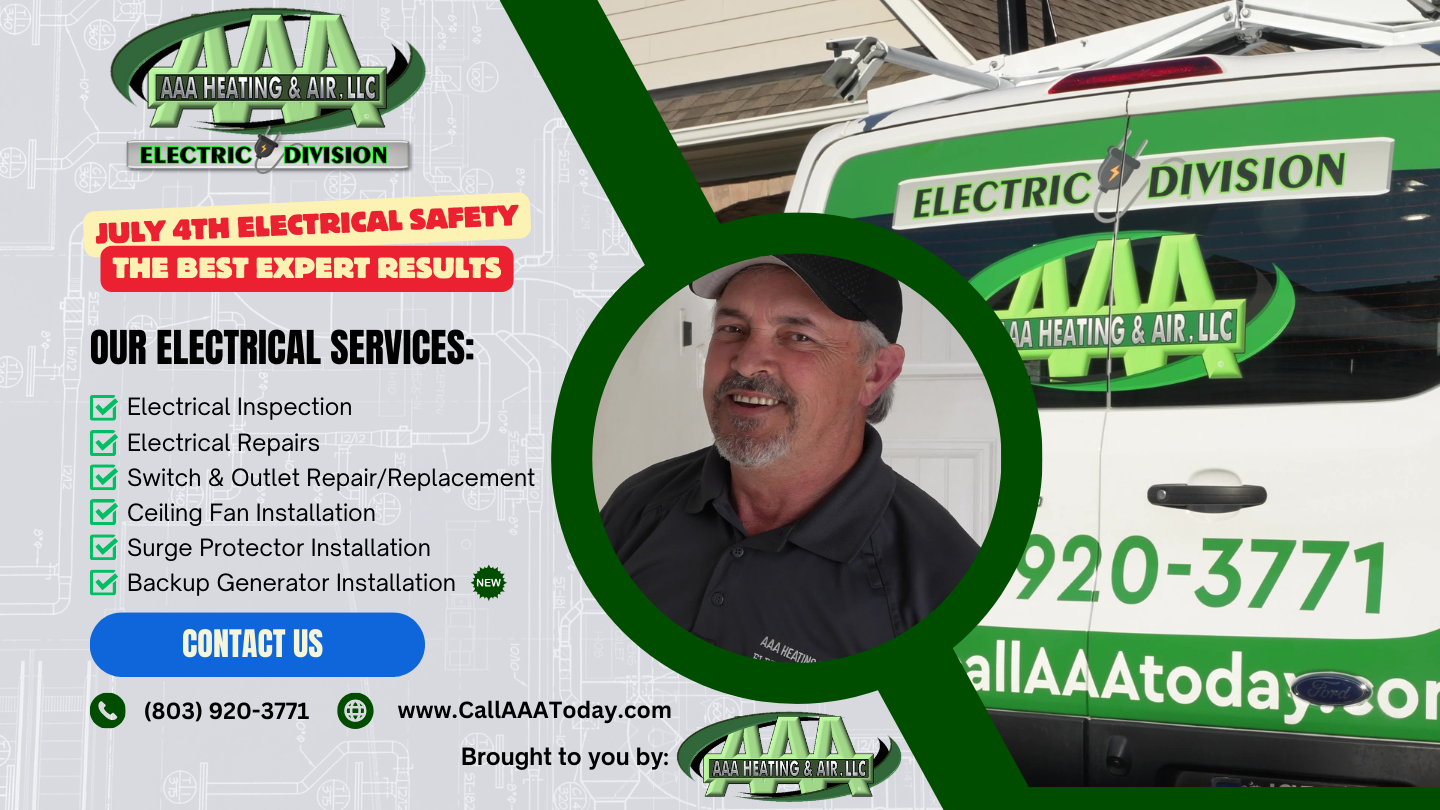The Fourth of July is a time of celebration, marked by fireworks, barbecues, and gatherings with family and friends. While it’s a joyous occasion to honor American independence, July 4th Electrical Safety is a priority, especially when it comes to electrical hazards. Many festivities involve the use of electrical equipment, from lighting up the night with spectacular displays to powering up appliances for a backyard cookout. This comprehensive guide will help you enjoy a safe and memorable Independence Day by highlighting key electrical safety tips.
1. Understanding Common Electrical Hazards
Before diving into safety tips, it’s crucial to understand the potential electrical hazards associated with Fourth of July activities:
- Overloaded Circuits: The increased use of electrical devices can lead to overloaded circuits, which can cause electrical fires.
- Water and Electricity: Pool parties and water activities pose a risk if electrical devices are used near water.
- Fireworks: Handling fireworks improperly can lead to electrical burns or fires if they come into contact with power lines or other electrical sources.
- Extension Cords and Outdoor Lighting: Improper use of extension cords and outdoor lighting can create hazards such as electrical shocks or short circuits.
2. Safe Use of Outdoor Electrical Equipment
July 4th Electrical Safety includes outdoor electrical equipment which is commonly used during Fourth of July celebrations:
- Use Outdoor-Rated Equipment: Ensure that all electrical equipment, such as extension cords and lighting, is rated for outdoor use. Indoor-rated equipment is not designed to withstand exposure to moisture and can be a significant safety hazard.
- Inspect Equipment: Before use, check all equipment for signs of damage, such as frayed cords or exposed wires. Damaged equipment should be replaced immediately.
- Avoid Overloading Outlets: Do not plug too many devices into a single outlet or extension cord, as this can lead to overheating and fire.
3. Safety Tips for Using Extension Cords
Extension cords are often a necessity during outdoor festivities, but they can pose significant risks if not used correctly:
- Choose the Right Extension Cord: Use a heavy-duty extension cord rated for the wattage of the devices you plan to connect.
- Keep Cords Dry: Ensure that extension cords are kept away from water sources and do not allow them to rest on wet ground.
- Prevent Tripping Hazards: Place extension cords in areas where they won’t be a tripping hazard, and consider using cord covers to secure them safely.
4. Fireworks Safety and Electrical Precautions
Fireworks are a quintessential part of the Fourth of July, but they require careful handling to avoid electrical hazards:
- Stay Clear of Power Lines: Always set up fireworks well away from overhead power lines to prevent any accidental contact that could result in electrical fires or shocks.
- Use Fireworks Responsibly: Follow local laws and guidelines for fireworks use. Never attempt to modify or create your own fireworks, as this can lead to dangerous malfunctions.
- Have Fire Safety Equipment Ready: Keep a bucket of water or a fire extinguisher nearby when using fireworks to quickly extinguish any accidental fires.
5. Electrical Safety Around Water
Many Fourth of July celebrations involve water activities, which require extra precautions when it comes to electricity:
- Keep Electrical Devices Away from Water: Never use electrical appliances, such as radios or fans, near pools or water sources.
- Install Ground Fault Circuit Interrupters (GFCIs): GFCIs are essential in areas where water and electricity may come into contact. They can quickly shut off power in the event of a ground fault, reducing the risk of electric shock.
- Educate Guests: Make sure your guests, especially children, understand the dangers of mixing water and electricity.
6. Grill and Appliance Safety
Barbecuing is a staple of Fourth of July celebrations, but July 4th Electrical Safety involves using electrical appliances safely:
- Check Electrical Grills: If using an electric grill, inspect the cord and connections for any damage before use. Ensure the grill is placed on a stable, dry surface away from water.
- Use Appliances Correctly: Follow the manufacturer’s instructions for all electrical appliances, including fans, speakers, and lights. Never use them in a way they weren’t designed for.
- Turn Off When Not in Use: Always turn off and unplug electrical appliances when not in use to prevent potential overheating and electrical fires.
7. Lighting Safety for Night Celebrations
July 4th Electrical Safety includes the lighting that plays a big role in creating the perfect ambiance for nighttime celebrations:
- Use LED Lights: LED lights are energy-efficient and generate less heat, reducing the risk of overheating and fire.
- Secure Lighting Properly: Ensure that all outdoor lights are securely fastened to avoid them falling and causing a hazard.
- Avoid Excessive Lighting: Too much lighting on a single circuit can overload it and increase the risk of an electrical fire. Distribute lighting across multiple circuits if necessary.
8. Emergency Preparedness
Despite all precautions, accidents can happen. Being prepared can make a significant difference in an emergency:
- Know How to Cut Power: Familiarize yourself with the location of your circuit breaker or fuse box and know how to cut off power in an emergency.
- Keep Emergency Contacts Handy: Have a list of emergency contacts, including your local fire department and electric company, in case of an emergency.
- Educate Your Family: Make sure everyone in your household knows what to do in case of an electrical emergency.
Celebrating the Fourth of July is a cherished tradition, but July 4th electrical safety should always be a top priority. By following these electrical safety tips, you can ensure a fun, memorable, and hazard-free holiday. Remember, a safe celebration is a happy celebration! Call (803) 889-0686 to speak with one of our locally employed Professional Service Representatives or click HERE to use our online Service Request form 24/7.

Written by: Jared M. Sewell

